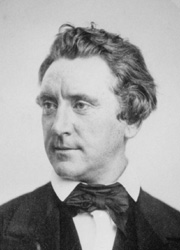From The New-York Times December 24, 1860:
BALTIMORE, Sunday, Dec. 23.
An important meeting, attended by many prominent citizens, was held at the Universalist Church last night, to consider the national crisis. Chief Justice LEGRAND presided, and JNO. U.L. MCMAHAN was among the fifty Vice-Presidents.
Judge LEGRAND made a speech, taking strong Southern grounds.
Mr. RIAN, a prominent merchant, offered resolutions, asking the Governor immediately to convoke the Legislature.
COLEMAN YELLOTT, State Senator, and WILLIAM NORRIS, made speeches sustaining the resolutions, which were unanimously passed.
The speeches were all conservative, but were unmistakeable in urging determined action on the part of Maryland to meet the difficulties, and to place herself right — in the Union if possible, but at all hazards with a united South. Much dignity was preserved in the proceedings, and a strong sympathy for Southern cooperation manifested. South Carolina was frequently cheered.
The Tribune’s announcement of LINCOLN’s unwillingness to concede or compromise was indignantly commented upon. Maryland seems to be catching the Southern feeling rapidly.
A hundred guns were fired here on Saturday in honor of South Carolina, but the parties firing probably do not represent the general public.
MEMPHIS, Saturday, Dec. 22.
There was an enthusiastic meeting here last night to ratify the secession of South Carolina. Fifteen guns were fired, and the Avalanche newspaper office and other buildings illuminated.
PETERSBURG, Sunday, Dec. 23.
A secession pole, one hundred feet high, with the Palmetto flag, was hoisted on the most prominent street, yesterday morning, amid the cheers from a large crowd. The pole was sawed down this morning, just before the dawn of day, by an unknown party, and the flag carried off. Great excitement prevails, and a collision is feared.
John Carroll LeGrand would be defeated for re-election and die in 1861.

